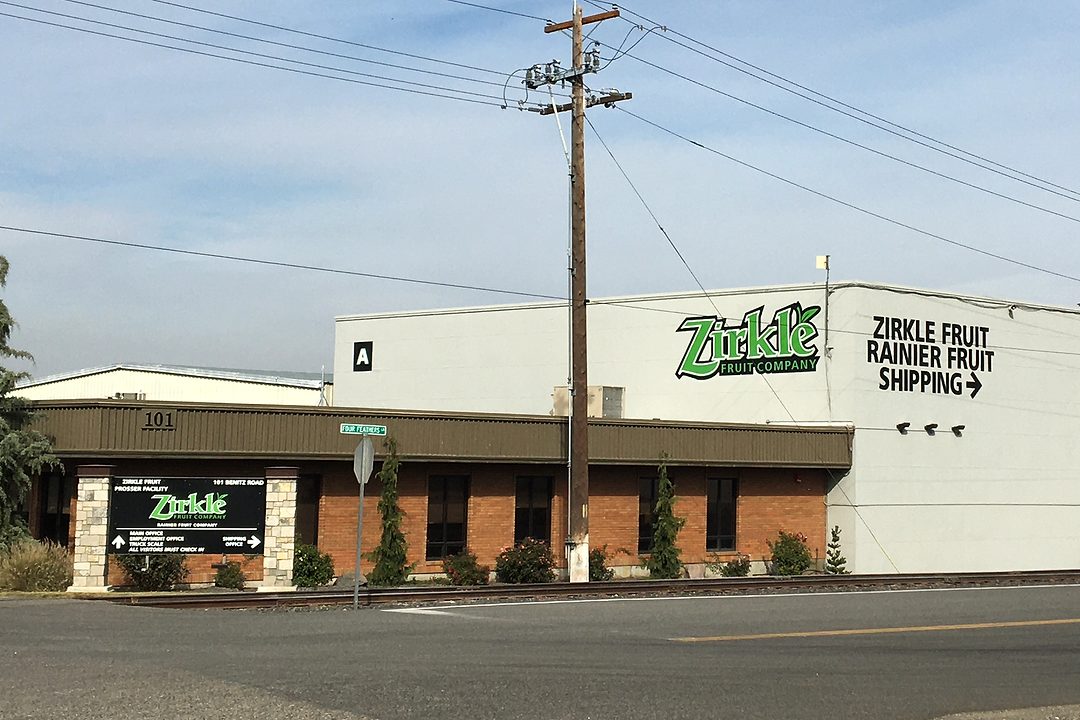
Home » 300 layoffs loom as plant shuts down apple packing line
300 layoffs loom as plant shuts down apple packing line

October 14, 2019
By Andrew Kirk
Almost 100 people will lose their jobs at Zirkle Fruit Co.’s Prosser plant in October and about 200 more will be laid off in the coming months.
The layoffs are necessary as the Selah-based Zirkle Fruit Co.’s plant at 101 Max Benitz Road closes its apple packing line. The layoffs begin Oct. 17.
A company statement said it was a “difficult decision,” and “we see employees as part of the family,” but also that “maintaining and continually modifying multiple apple packing operations has been a difficult task.”
Zirkle will consolidate its apple packing operations at its Selah facility.
“Zirkle Fruit will continue to store bulk fruit and run their winery operations year-round at the Prosser facility. They will also pack and ship cherries seasonally and this is expected to generate approximately 300 seasonal positions,” according to a statement released by the company.
Deb Heintz, executive director of the Prosser Economic Development Association, said about 20 percent of the 300 employees—or roughly 50 people— are Prosser residents.
Heintz said the company is working to relocate as many of the 300 apple packing workers to Selah as possible. That’s good for the workers but still a loss for Prosser, she said.
“We had an influx of people here every day. They need groceries, to buy fuel, to shop businesses here. It makes a difference for the economic base in our community,” Heintz said. “We don’t like to see these things, but they happen.”
When a ConAgra Lamb Weston potato processing facility in Prosser closed in 2010 it took about 75 jobs with it. The plant was eventually bought by a new company, and it brought jobs—but not as many as were lost, Heintz said.
Heintz also said the Zirkle apple processing closure isn’t surprising.
“Ag has been hit very hard in general the last six years. They need to catch a break,” she said.
Chris McGann, spokesman for the state Department of Agriculture, agreed tariffs, low milk prices and drought conditions have created challenges for Eastern Washington farmers.
Despite the challenges, the state boasts a $10.5 billion average in production value from more than 300 products.
That said, Washington state was home to fewer farms between 2012-17, with less land dedicated to orchards, according to U.S. Department of Agriculture data.
Heintz pointed to other bright spots in Prosser, where the population has grown 7.5 percent in the past nine years to more than 6,100 people.
Heintz said the city’s building permit requests for the first nine months of the year are nearly double the previous record set in 2016. “Quite frankly commercial and residential construction growth is off the charts,” she said.
Total permit valuation for 2015-16 averaged $23.5 million annually, Heintz said. Prior to that, the average was about $8 million annually. The last two years have averaged about $20 million annually, but this year is on track to be more than $40 million, she said.
Heintz also said the building occupied by the former Shopko Hometown store, which closed in spring 2019, could have a new occupant soon that could bring 35 to 40 new jobs.
Shopko declared bankruptcy in early 2019 and shuttered stores nationwide, including Kennewick’s.
Heintz said the Shopko closure created a need in the community for new retailers, and the association is working to recruit businesses.
As the Zirkle layoffs loom, the company and several agencies stand by to help affected employees.
“We are now doing everything in our power to be there for the impacted employees, with as many resources as possible, during this difficult transition,” according to the company’s statement.
The Worker Adjustment and Retraining Notification Act generally requires companies with 100 or more employees to provide notice 60 days prior to closures and layoffs. Notices must be given to affected workers or their representatives, the local government and the state’s rapid response team, which works to aid workers losing their jobs.
Crystal Bright, operations manager for WorkSource Columbia Basin, said once this notice is filed, several partnering entities—including government, educational institutions and private agencies—collaborate to offer assistance and information to laid-off workers.
This includes unemployment insurance, an explanation of how WorkSource can help with employment and training, such as labor exchange and dislocated worker services, as well as other resources.
Anyone affected by the Zirkle Fruit layoffs can seek these services by contacting Jamilet Nerell at 509-734-5984 or jnerell@bf-wdc.org.
Local News
KEYWORDS october 2019





